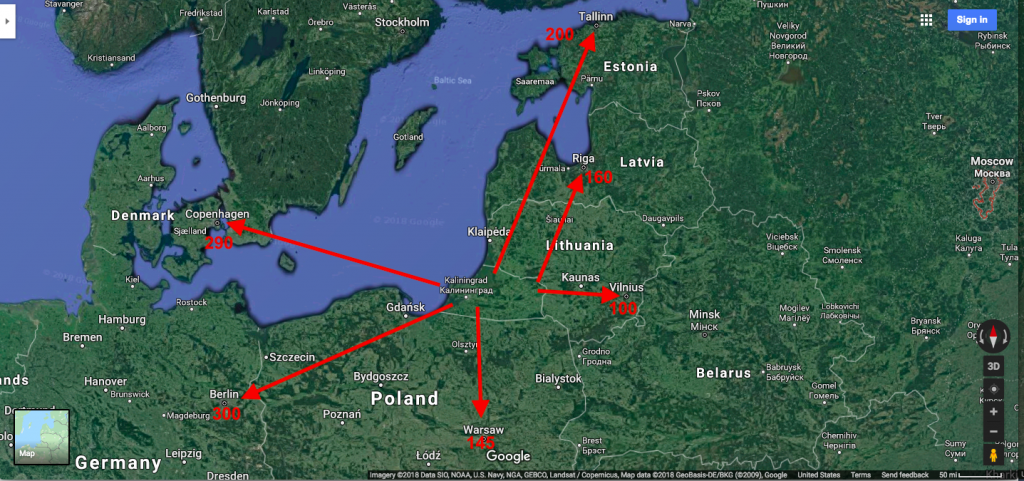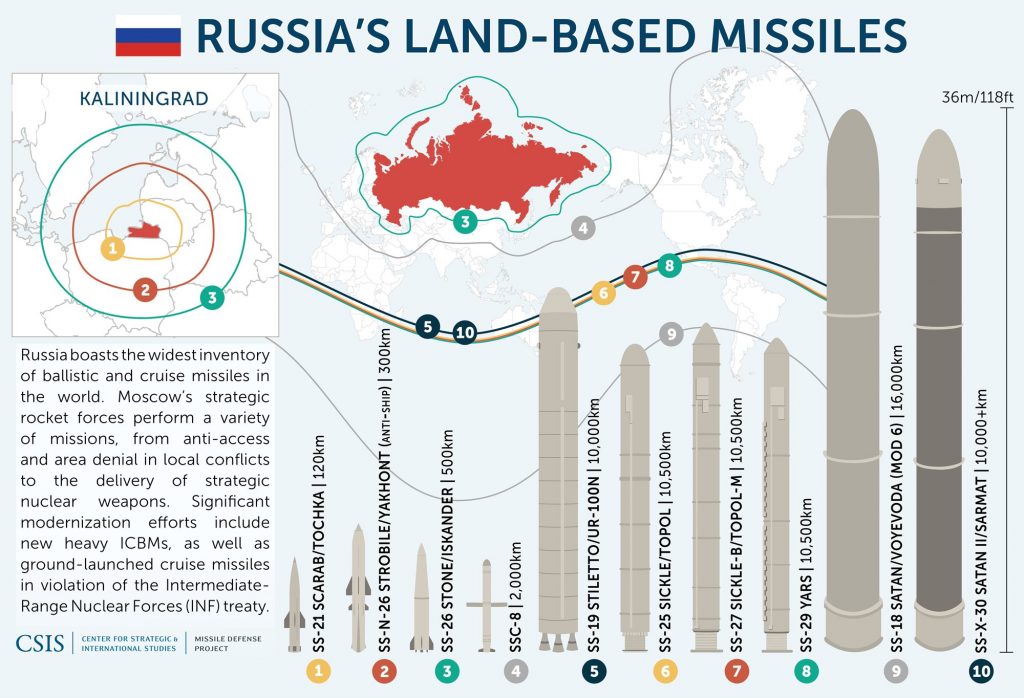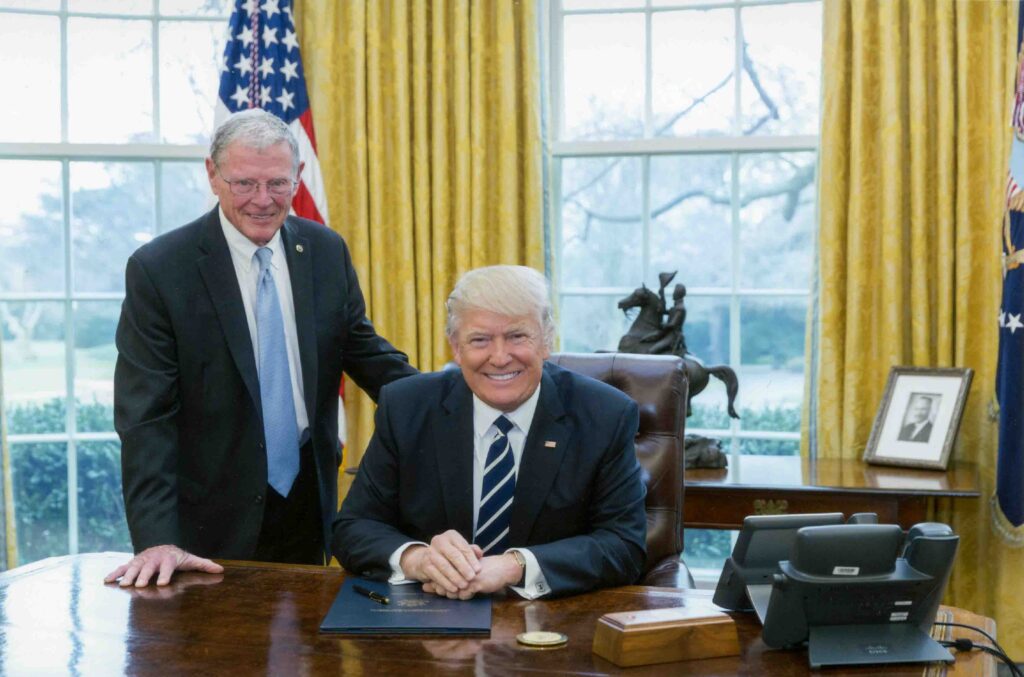US Gives Russia 60 Days Before INF Withdrawal; NATO Comes Around
Posted on

Approximate ranges in miles between the Russian enclave in Kaliningrad and select NATO capitals. SOURCE: Google Maps
WASHINGTON: NATO will fully support Washington’s 60-day ultimatum to Russia to come back into compliance with the 30 year-old Intermediate-Range Nuclear Forces (INF) accord, the alliance’s chairman said today in Brussels. If Russia doesn’t comply, NATO chairman Jens Stoltenberg said, the allles will “start to prepare for a world without the treaty,”
Stoltenberg’s warning came alongside a statement affirming all 29 NATO members agreed Russia had fielded a missile with a range between 300 and 3,400 miles, which violates the treaty. “We strongly support the finding of the United States that Russia is in material breach of its obligations under the INF Treaty,” a NATO statement said.
Secretary of State Mike Pompeo said Tuesday in Brussels that the United States would give Russia 60 days to return to compliance, or else Washington, would unilaterally pull out of the agreement. Just yesterday, President Trump had called for arms-control negotiations with both China and Russia, hoping to reduce US defense spending he called “crazy!” Assuming the juxtaposition was deliberate rather than Trumpian improvisation, it suggests the Administration hopes its ultimatum will drive the Kremlin to the negotiating table after years of private cajoling and public shaming failing.
I am certain that, at some time in the future, President Xi and I, together with President Putin of Russia, will start talking about a meaningful halt to what has become a major and uncontrollable Arms Race. The U.S. spent 716 Billion Dollars this year. Crazy!
— Donald J. Trump (@realDonaldTrump) December 3, 2018
Russia continues to deny that it has violated the treaty, while accusing the US of being in breach by developing drones that can deliver warheads within the prohibited distances. That charge has been roundly rejected by Washington, its allies, and a range of missile defense experts. For its part, the White House has complained bitterly that Russia has lied about its missile development program and that China — who is not a signatory — has developed hundreds of missiles in the banned category, putting US naval vessels and military bases in the Pacific at risk.
“There is no reason the United States should continue to cede this crucial military advantage to revisionist powers like China,” Pompeo said Tuesday.

Secretary Pompeo meets with NATO Secretary General Jens Stoltenberg, in Brussels, Belgium on December 4, 2018.
China’s missile stockpile has been a growing concern for the US and its Pacific allies for years. American analysts estimate at least 90 percent of Beijing’s arsenal falls within the treaty’s 300 to 3,400 mile restriction.
Tuesday’s coordinated public rollout of the plan by Stoltenberg and Pompeo came after a hard-fought compromise between Washington and its European allies, who sought to slow the pace of the US withdrawal.
The Washington Post obtained a memo from National Security Advisor John Bolton that called for the State Department to “make all necessary arrangements” to start the withdrawal “no later than December 4, 2018.” The memo also directed the Pentagon to “develop and deploy ground-launched missiles at the earliest possible date.”
European allies have continued to be uneasy over the US withdrawal, announced this fall by president Trump, fearing that it would kick off a Cold War-style arms race on the continent with hundreds or thousands of new missiles pointed directly at their capitals.
Breaking Defense reported exclusively in October that the Pentagon had long planned for the day when treaty with Russia would be ripped up, however. A previously unreleased report by the Joint Staff and Strategic Command made clear that as far back as 2013 — a year before the Obama administration first publicly complained about Russian violations of the treaty — the Defense Department was considering which technologies the US could develop should Washington walk away from the INF.
It’s Up To Russia
“The burden falls on Russia to make the necessary changes,” Pompeo said. “Only they can save this treaty.”
If Russia does not come back into compliance at the conclusion of the 60-day deadline, the administration will kick off a six-month process to withdraw from the treaty. During that time however, the US will still not test or deploy missiles that would abrogate the treaty, Pompeo said.
The State Department released a long statement Tuesday with new information about US efforts to work with Russia since 2013, after US intelligence first began to pick up information about the 9M729 cruise missile program.
Since 2013, there had been “more than 30 engagements at all levels of the Russian government,” to discuss the 9M729 missile the State Department said, but “Russia has repeatedly changed its cover story regarding its violating missile.” That timeline puts the start of the talks during the Obama administration.
Moscow first denied the weapon existed, despite the Americans sharing details about where it was tested and the names of the companies involved in its development. Russia finally admitted that the missile existed after the Americans publicly named the missile.
On Friday, Director of National Intelligence Dan Coats gave a little-noticed speech in which he detailed the covert Russian program, which he said began in the mid-2000s. The 9M729 can carry either a conventional or a nuclear warhead, he said; it was designed by Russian missile-maker Novator to closely resemble other cruise missiles that the company was developing at the time.
By 2015, the Russians wrapped up “a comprehensive flight test program consisting of multiple tests of the 9M729 missile from both fixed and mobile launchers,” he said, which were “purposefully designed to disguise the true nature of their testing activity as well as the capability of the 9M729 missile.”
The Hill & The Allies
Several key House and Senate Republicans said on Tuesday it was about time the west got serious with Russia about the violations. Sen. Jim Inhofe, chairman of the Senate Armed Services Committee, praised the administration’s action, saying the US “will no longer tolerate Russian deception at the expense of national security and the security of our allies.” He also expressed doubt that Moscow would come around. “Can Putin be trusted to uphold Russia’s international commitments? I won’t hold my breath.”
Congressman Mike Turner, chairman of the US delegation to the NATO Parliamentary Assembly and head of the House Armed Services Subcommittee on Tactical Air and Land Forces, added the US “cannot continue to comply with this treaty while our highly aggressive adversary is violating it. A path to withdrawal is warranted at this juncture, and I support the action taken today.”
A trio of influential Democratic Senators sent a letter to president Trump on Monday however, claiming he administration’s “sudden decision to withdraw unilaterally is a political and geostrategic gift to Russia,” which takes the focus away from “Russia’s transgressions and malign behavior” without any strategic alternative.
Rep. Adam Smith, the incoming chair of the House Armed Services Committee, said in a statement that he’s also disappointed in the administration’s plans to withdraw, as “the Trump administration should instead work with our allies to take meaningful actions to hold Russia accountable for its violation of the treaty, press Russia back into compliance, and avoid a new arms race.”
Despite many in Europe opposing the US calls to withdraw from the treaty, NATO’s Stoltenberg insisted that the western alliance was speaking with one voice.
“A situation where the US abides by the treaty and Russia does not is simply not sustainable,” he said. “We will do this as an alliance, we will collectively develop a response. I regret that we will now see the end of the INF treaty, but we have no alternative.”
Subscribe to our newsletter
Promotions, new products and sales. Directly to your inbox.



